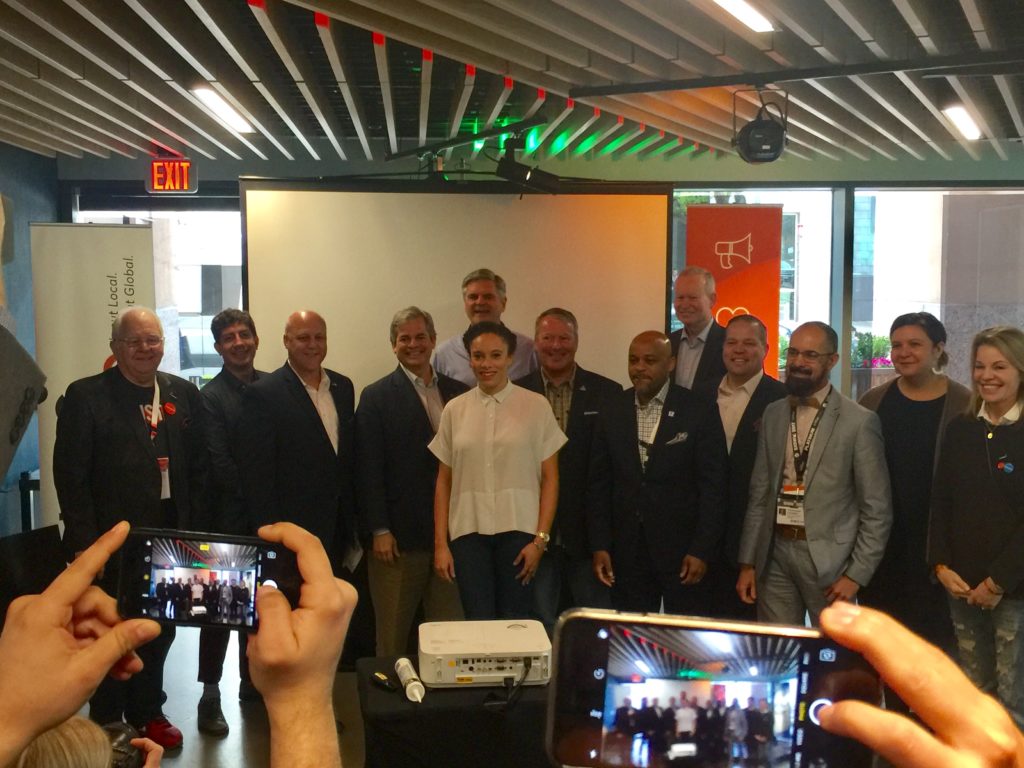At SXSW, seven startups had the opportunity to pitch a group of mayors and tech leaders on their unique approaches to addressing civic challenges.
Hosted by the U.S. Conference of Mayors and the City of Austin with support from Amazon Web Services, the Civic I/O Mayors Match Up featured a strong lineup of entrepreneurs from across the country working to fix problems as diverse as deteriorating roads, recycling household chemical waste, improving local government workflows, and facilitating safer interactions between police and people with mental illness.
The event was kicked off by Austin Mayor Steve Adler and MCed by Oklahoma City Mayor Mick Cornett. Cornett helped to welcome the judges, which were divided into two panels:
Mayors: Christopher Cabaldon (West Sacramento, CA), Michael Hancock (Denver, CO), and Buddy Dyer (Orlando, FL)
Technical: Lane Becker (18F), Steve Case (AOL, Rise of the Rest), Kim Majerus (Amazon Web Services), and Nicole Neditch (Code for America)
This post will highlight the top three teams, but be sure to check out the other four participants: IdeaSeed4Laundromats, CityGrows, Cityflag, and JustFix.nyc
Third place: Smarter Sorting ($2,500)
Austin’s Smarter Sorting has a patent-pending technology to help cities better sort their household chemical waste. In turn, they lower the cost that cities pay to handle their waste stream and increase the amount of chemicals that are diverted into reuse rather than incineration.

Smarter Sorting developed hardware that’s placed at a waste facility, allowing staff to scan each item that comes through. Once scanned, their software assists staff with routing the item into the proper bin — improving sorting accuracy and lowering the cost of processing. Smarter Sorting then uses the data they collect to identify opportunities to connect the waste streams to businesses that use those high-value chemicals.
Smarter Sorting already has a live pilot here in Austin, working with Austin Resource Recovery, and has commitments to begin pilots with Portland, OR, Mesa County, CO, and Salt Lake City, UT.
Second place: RoadBotics ($5,000)
Pittsburgh’s RoadBotics helps cities to monitor and manage one of the most important and expensive pieces of infrastructure: roads. Using AI technology developed at the Carnegie Mellon University Robotics Institute, RoadBotics’ smartphone app allows any car, truck, or bike to identify and rate a wide array of roadway conditions, including cracks, potholes, signage, vegetation, and debris.
By attaching the phone to a dash mount, the app gives the phone’s camera a full view of the road and automatically uploads the data into their AI-driven cloud platform to be analyzed. The video data, combined with the phone’s other sensor capabilities, helps RoadBotics to precisely calculate roadway metrics. This allows cities to be proactive instead of reactive as they manage their roadways.
RoadBotics is doing product testing with cities in Contra Costa County, CA, and the Port Authority of Allegheny County, PA. They are also preparing to do a pilot test with the United States Postal Service, the largest fleet in America.
First place: RideAlong ($10,000)
Top prize went to San Francisco’s RideAlong, a software tool that gives police officers key information about people with mental illness at the scene — everything from tailored de-escalation techniques to personalized service referral options.

The judging panel recognized the immense benefit this provides to a community, as many officers respond to calls with minimal information — potentially creating dangerous consequences for citizens. Of the people killed during police interactions in 2016, 25 percent had a known mental health issue.
RideAlong’s system provides information from family members, social service providers, and other first responders, including expected behaviors, past police interactions, and tips to calm the person. Officers can access RideAlong through the 911 system en route to calls, allowing the police to help connect vulnerable residents with long-term care and effectively directing limited city resources.
RideAlong has an initial pilot with Seattle, where officers previously had to search their email inboxes (while driving) for similar information stored in .pdfs sent to the entire force.

